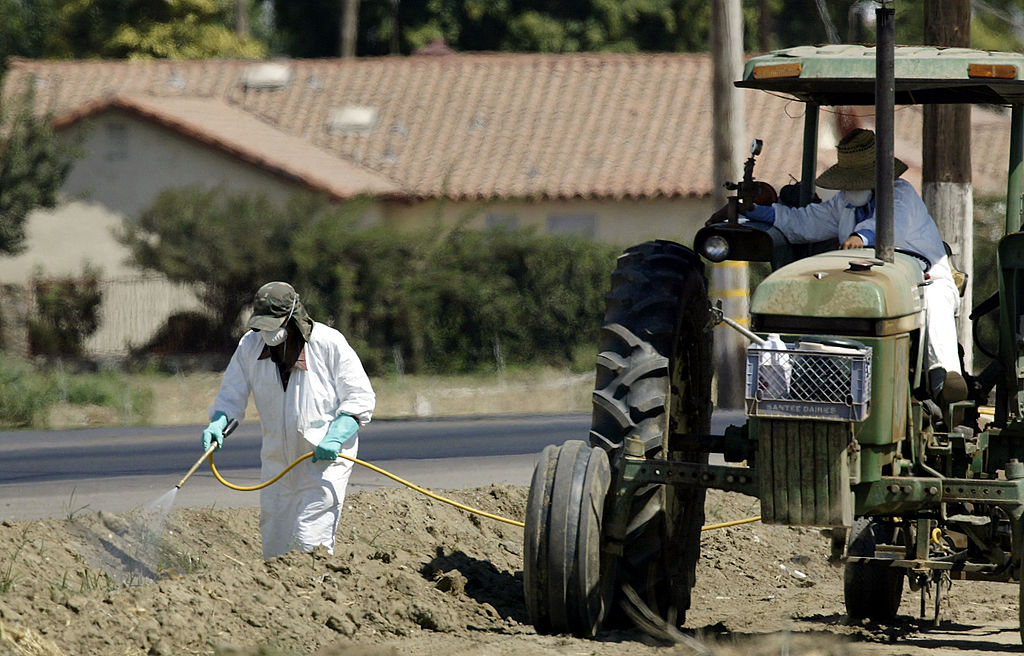Pesticide company wants Trump to throw out study showing how chemicals harm endangered species


A free daily email with the biggest news stories of the day – and the best features from TheWeek.com
You are now subscribed
Your newsletter sign-up was successful
Dow Chemical is pressuring the Trump administration to throw out a 10,000-page study compiled by government scientists that concluded several popular pesticides are dangerous to 1,800 critically threatened or endangered species, The Associated Press reports. Lawyers from the company sent letters to the heads of three Cabinet agencies last week asking that the study, which was compiled over the course of four years, be "set aside."
Dow's chairman and CEO, Andrew Liveris, is a friend and close adviser of President Trump, and his company donated $1 million to Trump's inauguration. "Dow actively participates in policymaking and political processes, including political contributions to candidates, parties, and causes, in compliance with all applicable federal and state laws," said Dow's director of public affairs, Rachelle Schikorra. "Dow maintains and is committed to the highest standard of ethical conduct in all such activity."
The three pesticides under review are chlorpyrifos, diazinon, and malathion. Last month, EPA Administrator Scott Pruitt tore up an Obama-era effort to ban the use of chlorpyrifos on food, which had been put in place after a study found that even small amounts of exposure to the pesticide could hamper children's brain development. Chlorpyrifos originate from a nerve gas developed by Nazi Germany, and Dow sells about 5 million pounds in the U.S. each year. The pesticide is so popular, in fact, that a 2012 study in California found 87 percent of umbilical-cord blood samples from newborns contained levels of chlorpyrifos.
The Week
Escape your echo chamber. Get the facts behind the news, plus analysis from multiple perspectives.

Sign up for The Week's Free Newsletters
From our morning news briefing to a weekly Good News Newsletter, get the best of The Week delivered directly to your inbox.
From our morning news briefing to a weekly Good News Newsletter, get the best of The Week delivered directly to your inbox.
Likewise, the Bush administration banned diazinon from residential use in 2005 after finding it posed a health risk to children, although it is still sprayed on fruits and vegetables by farmers. Malathion, which controls fruit flies and mosquitoes, is also the poison used in some shampoos that treat lice.
The federal scientists found that chlorpyrifos are "likely to adversely affect" 1,778 of the 1,835 animals and plants in its study. Diazinon and malathion were also found to be alarmingly threatening to vulnerable species. The findings of the study are expected to result in new regulations.
"Endangered species are the canary in the coal mine," warned Brett Hartl, the government affairs director for the Center for Biological Diversity. Dow's lawyers called the research "not reliable."
A free daily email with the biggest news stories of the day – and the best features from TheWeek.com
Jeva Lange was the executive editor at TheWeek.com. She formerly served as The Week's deputy editor and culture critic. She is also a contributor to Screen Slate, and her writing has appeared in The New York Daily News, The Awl, Vice, and Gothamist, among other publications. Jeva lives in New York City. Follow her on Twitter.
-
 How the FCC’s ‘equal time’ rule works
How the FCC’s ‘equal time’ rule worksIn the Spotlight The law is at the heart of the Colbert-CBS conflict
-
 What is the endgame in the DHS shutdown?
What is the endgame in the DHS shutdown?Today’s Big Question Democrats want to rein in ICE’s immigration crackdown
-
 ‘Poor time management isn’t just an inconvenience’
‘Poor time management isn’t just an inconvenience’Instant Opinion Opinion, comment and editorials of the day
-
 TikTok secures deal to remain in US
TikTok secures deal to remain in USSpeed Read ByteDance will form a US version of the popular video-sharing platform
-
 Unemployment rate ticks up amid fall job losses
Unemployment rate ticks up amid fall job lossesSpeed Read Data released by the Commerce Department indicates ‘one of the weakest American labor markets in years’
-
 US mints final penny after 232-year run
US mints final penny after 232-year runSpeed Read Production of the one-cent coin has ended
-
 Warner Bros. explores sale amid Paramount bids
Warner Bros. explores sale amid Paramount bidsSpeed Read The media giant, home to HBO and DC Studios, has received interest from multiple buying parties
-
 Gold tops $4K per ounce, signaling financial unease
Gold tops $4K per ounce, signaling financial uneaseSpeed Read Investors are worried about President Donald Trump’s trade war
-
 Electronic Arts to go private in record $55B deal
Electronic Arts to go private in record $55B dealspeed read The video game giant is behind ‘The Sims’ and ‘Madden NFL’
-
 New York court tosses Trump's $500M fraud fine
New York court tosses Trump's $500M fraud fineSpeed Read A divided appeals court threw out a hefty penalty against President Trump for fraudulently inflating his wealth
-
 Trump said to seek government stake in Intel
Trump said to seek government stake in IntelSpeed Read The president and Intel CEO Lip-Bu Tan reportedly discussed the proposal at a recent meeting
